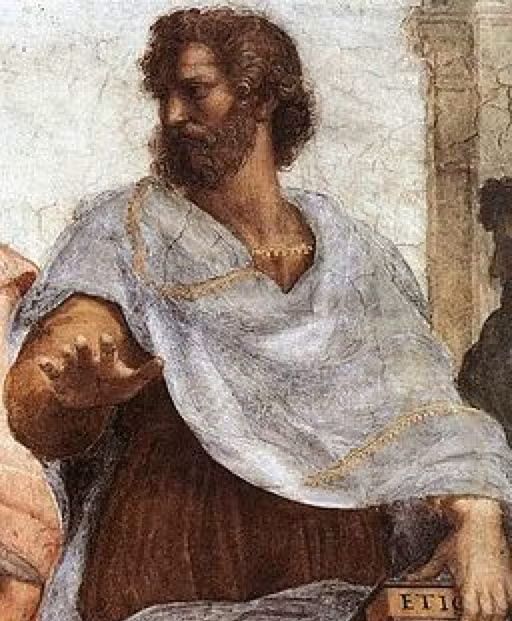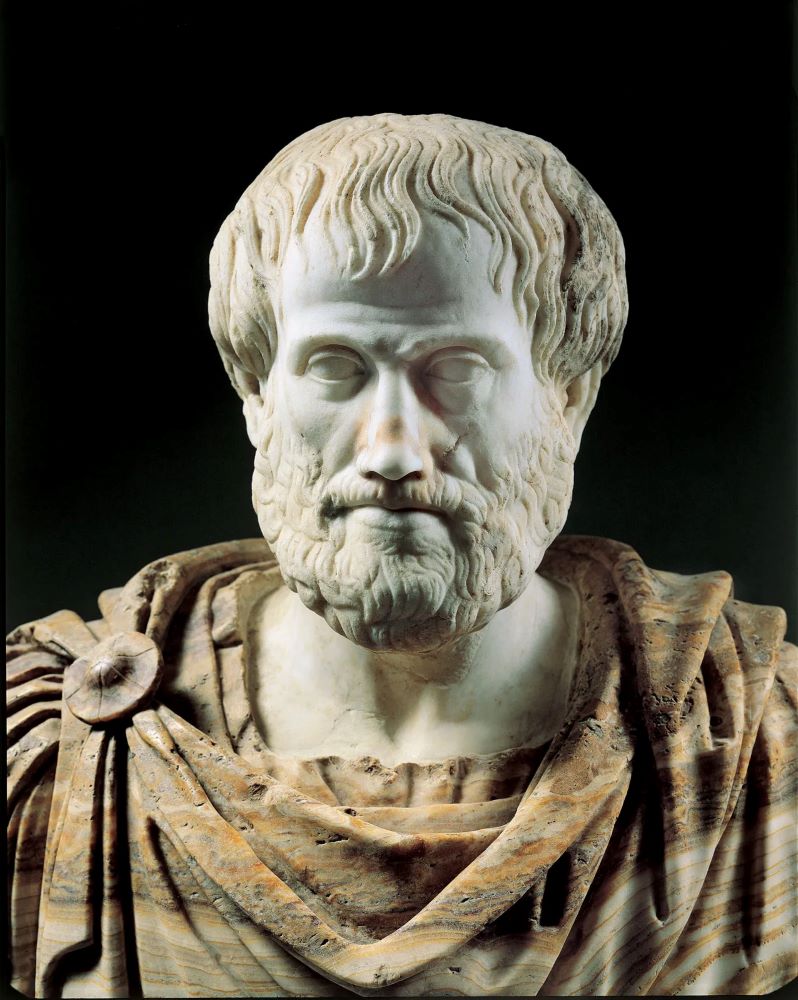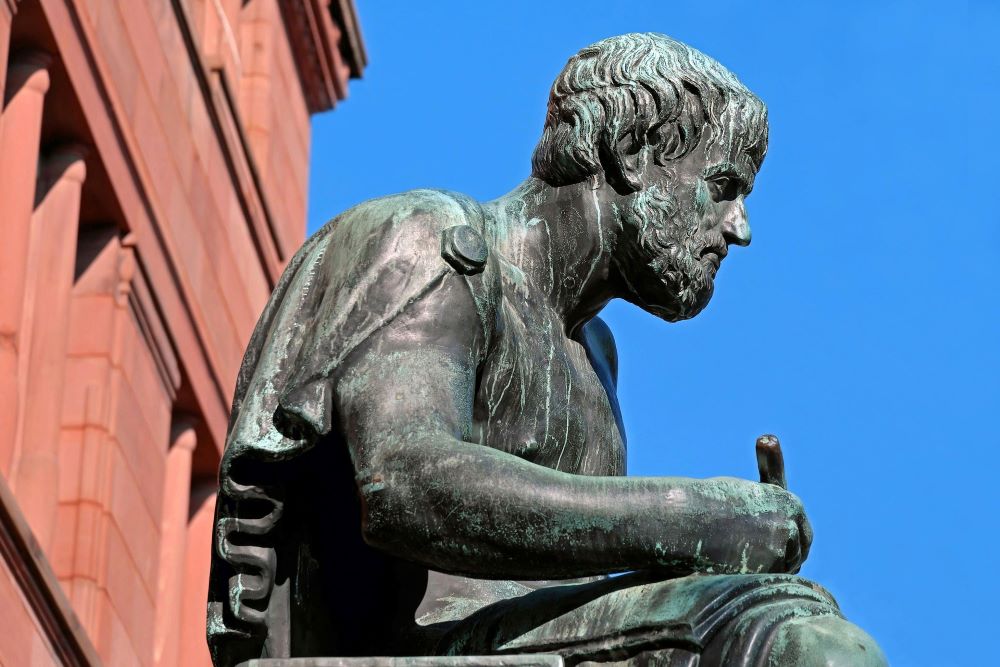story of Aristotle
The Sage & Philosopher
 Painting of Aristotle
Painting of AristotleAristotle is one of the ancient Greek philosophers.
He is recognized as one of history's most influential philosophers, whose works and ideas have shaped Western thought for more than two thousands years.
His contributions include numerous fields, including logic, metaphysics, ethics, biology, physics, politics, and poetics.
Aristotle Early Life and Family Background
Aristotle was born in 384 BCE in Stagira, a small town in northern Greece.
He was born into a privileged family. His father, Nicomachus, served as the personal physician to King Amyntas III of Macedonia.
This connection to the Macedonian court later proved significant in Aristotle's life.
His mother, Phaestis, came from a wealthy family from the island of Euboea.
Unfortunately, Aristotle's parents died when he was young, around the age of 13.
His guardian, Proxenus of Atarneus, took charge of his education and upbringing.
This early loss might have influenced his later philosophical investigations into questions of life, death, and the nature of existence.
Education and Early Career
At the age of 17, Aristotle traveled to Athens, the intellectual center of the ancient world, to study at Plato's Academy.
He remained there for twenty years (367-347 BCE), first as a student and later as a teacher.
During this time, he earned a reputation as the "mind of the school".
At the same time, he developed his own philosophical views, some of which were divergent from Plato's teachings.
After Plato's death in 347 BCE, Aristotle left Athens.
Instead of remaining at the Academy under its new leadership, he accepted an invitation from his friend Hermias to stay in Assos, in Asia Minor.
There, he established his first philosophical school and married Pythias, Hermias's niece.
They had a daughter, also named Pythias.
Time in Macedonia and the Education of Alexander the Great
In 343 BCE, King Philip II of Macedonia invited Aristotle to tutor his son, Alexander (later known as Alexander the Great).
Aristotle spent seven years in Macedonia, educating the young prince in literature, philosophy, and politics.
This relationship had far-reaching consequences for both men.
However, they later became estranged due to political differences.
Return to Athens and the Lyceum
After Alexander ascended to the Macedonian throne, Aristotle returned to Athens in 335 BCE and established his own school, the Lyceum.
Unlike the Academy's focus on abstract mathematical principles, the Lyceum emphasized empirical research and the study of the natural world.
During this period, Aristotle wrote many of his most important works and conducted extensive research in various fields.
Major Works and Philosophical Contributions of Aristotle
 Statue of Aristotle
Statue of AristotleAristotle's surviving works cover an impressive range of subjects:
1. Logic and Reasoning
- The Organon (a collection of logical works)
- Prior Analytics (introducing syllogistic logic)
- Posterior Analytics (on scientific reasoning)
2. Natural Sciences
- Physics
- On the Heavens
- On Generation and Corruption
- Meteorology
- History of Animals
- On the Parts of Animals
- On the Movement of Animals
3. Metaphysics
- Metaphysics (examining the nature of being and reality)
4. Ethics and Politics
- Nicomachean Ethics
- Eudemian Ethics
- Politics
- Constitution of Athens
5. Rhetoric and Arts
- Rhetoric
- Poetics
Key Philosophical Ideas
1. Logic and Knowledge
Aristotle developed the first formal system of logic, introducing the syllogism as a tool for deductive reasoning. He believed that knowledge could be acquired through systematic observation and logical analysis.
2. Metaphysics
He proposed that reality consists of individual substances that possess both form and matter. His concept of the "unmoved mover" as the source of all motion and change influenced theological thinking for centuries.
3. Ethics
In the Nicomachean Ethics, Aristotle argued that the highest good for humans is eudaimonia (happiness or well-being), achieved through the exercise of virtue. He promoted the doctrine of the mean, suggesting that virtue lies between extremes.
4. Political Theory
Aristotle viewed humans as naturally political animals and believed that the city-state (polis) was the ideal form of political organization. He analyzed different forms of government and advocated for a mixed constitution combining elements of democracy and oligarchy.
5. Natural Science
His biological works demonstrated remarkable observational skills and established the foundations for the scientific study of life. He classified animals, studied their behavior, and conducted detailed anatomical investigations.
Aristotle's Final Years and Legacy
 Full Crafted Statue of Aristotle
Full Crafted Statue of AristotleIn 323 BCE, after Alexander's death, anti-Macedonian sentiment rose in Athens.
Aristotle, with his Macedonian connections, faced charges of impiety.
Remembering Socrates' fate, he fled to Chalcis, stating that he would not allow Athens to "sin twice against philosophy."
He died there in 322 BCE, reportedly from natural causes.
Aristotle's influence on Western thought was huge.
His works were preserved and transmitted through various cultures, particularly through Arabic translations during the Middle Ages.
When these were reintroduced to Western Europe, they became foundational texts in medieval universities and continued to influence education well into the modern era.
His contributions include:
1. Scientific Method
Aristotle's emphasis on empirical observation and logical analysis helped establish the foundations of scientific inquiry.
2. Biological Classification
His system of classifying living things influenced biological taxonomy until the modern era.
3. Literary Theory
His analysis of tragedy in the Poetics continues to influence literary criticism and dramatic theory.
4. Ethical Philosophy
His virtue ethics and concept of eudaimonia remain influential in modern moral philosophy.
5. Political Theory
His analysis of political systems and advocacy for mixed constitutions influenced political thought throughout history.
Critical Assessment
Later, many of Aristotle's specific scientific conclusions have been superseded by modern research.
However, his method of systematic investigation and logical analysis remains valuable.
His philosophical insights into ethics, politics, and metaphysics continue to generate discussion and debate.
Some criticisms of his work include:
- His acceptance of slavery as natural
- Limited recognition of women's capabilities
- Some incorrect scientific conclusions based on limited observational capabilities
However, these must be understood within the larger historical context of those prevailing times.
Despite that they don't diminish the remarkable achievement of creating comprehensive systems of thought across multiple disciplines.
Wrap Up
Unlike Socrates, Aristotle came from an affluent family. He had a different demeanor and confidence from very early years.
Aristotle's life and work represent one of the most ambitious and successful attempts to understand and explain the world in its entirety and the philosophy behind it.
His systematic approach to knowledge, emphasis on empirical observation, and logical analysis set standards that influenced scientific and philosophical inquiry for later 2000+ years.
Modern scholars have drawn many specific conclusions, however, Aristotle's his methods and many of his insights remain relevant today.
Aristotle's legacy lives on in contemporary discussions of ethics, politics, logic, and metaphysics, that demonstrates the enduring value of his philosophical contributions by him.
As a teacher, researcher, and systematic thinker, Aristotle exemplified the power of human reason to comprehend the complexities of existence of life and humanness.
Indeed, Aristotle is considered truly worthy of his reputation as one of history's greatest philosophers.
You may also read more about Aristotle here.
You can read about more History Stories at IdeasBeat